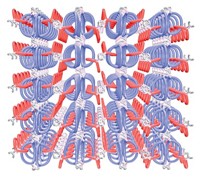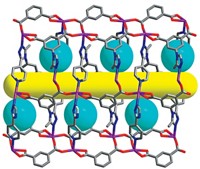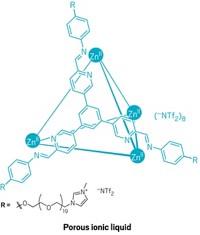Advertisement
Grab your lab coat. Let's get started
Welcome!
Welcome!
Create an account below to get 6 C&EN articles per month, receive newsletters and more - all free.
It seems this is your first time logging in online. Please enter the following information to continue.
As an ACS member you automatically get access to this site. All we need is few more details to create your reading experience.
Not you? Sign in with a different account.
Not you? Sign in with a different account.
ERROR 1
ERROR 1
ERROR 2
ERROR 2
ERROR 2
ERROR 2
ERROR 2
Password and Confirm password must match.
If you have an ACS member number, please enter it here so we can link this account to your membership. (optional)
ERROR 2
ACS values your privacy. By submitting your information, you are gaining access to C&EN and subscribing to our weekly newsletter. We use the information you provide to make your reading experience better, and we will never sell your data to third party members.
Nanomaterials
Tunable nanochannels enable selective gas adsorption
Nanoporous soft crystal offers temperature-dependent gas separation and storage
by Kerri Jansen
January 27, 2019
| A version of this story appeared in
Volume 97, Issue 4

Typical gas separation nanomaterials such as zeolites and microporous carbon have rigid pores, making it difficult to control gas diffusion within the material. Now, researchers led by Kyoto University’s Susumu Kitagawa have designed a nanoporous soft crystal that can selectively adsorb and store various gas molecules (Science 2019, DOI: 10.1126/science.aar6833). The material consists of a copper-based porous coordination polymer with metal centers linked by butterfly-shaped ligands made from isophthalic acid and phenothiazine 5,5-dioxide (OPTz). This structure forms an array of nanocages connected by diffusion channels. At low temperatures, the entrances to the nanocages are so small that gas molecules can’t fit through. But with increased temperature, the wing tips of the OPTz units flip up, enlarging the nanocage entrances and allowing the gas molecules to move from one nanocage to another. By varying the temperature, researchers can control the size of the cage entrances so that they selectively adsorb certain gases depending on their size. The team used the material to sieve oxygen from an oxygen-argon mixture and separate ethylene from ethane. And because the researchers can shut down gas diffusion by lowering the temperature, pre-adsorbed gas molecules can be locked into the material at ambient temperatures, providing potential long-lasting gas storage, the researchers say.





Join the conversation
Contact the reporter
Submit a Letter to the Editor for publication
Engage with us on Twitter